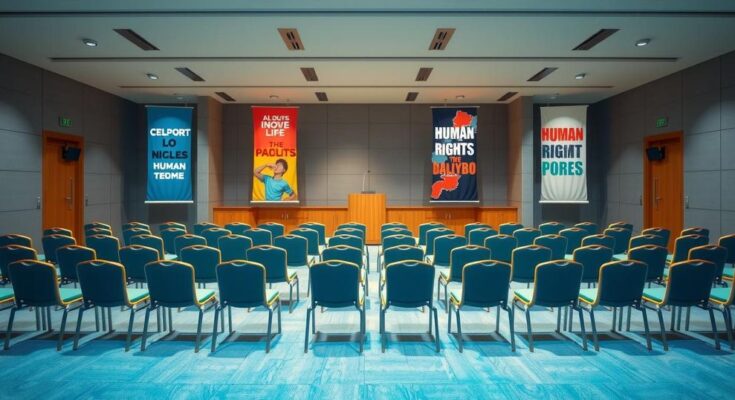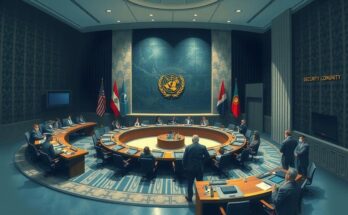A conference on human rights violations in Iran was held at the UN in Geneva on March 13, 2025, focusing on the rise in executions. Key speakers called for international accountability for the Iranian regime regarding the 1988 massacre and ongoing human rights abuses, culminating in a unified plea for stronger global interventions to protect victims.
On March 13, 2025, a significant conference was convened at the UN European Headquarters in Geneva during the 58th session of the UN Human Rights Council. The aim was to address the deteriorating human rights situation in Iran, with a particular focus on the alarming rise in executions. Political figures, legal experts, and relatives of individuals executed in Iran attended the event, emphasizing the need for international accountability for the Iranian regime’s actions.
The conference featured numerous notable speakers including Kirsty Brimelow, Claude Nicati, Senator Roberto Rampi, and Sahar Sanaii, among others. They collectively highlighted the urgent need for a resolute policy from the international community regarding the Iranian regime, particularly in relation to the 1988 massacre of political prisoners and ongoing human rights abuses.
Mojgan Joulaee, the event’s moderator, opened with a discussion about the drastic increase in executions and the broader context of human rights violations in Iran. She underscored the importance of international scrutiny and collective action to ensure justice for the victims and their families.
Kirsty Brimelow elaborated on the 1988 massacre, characterizing it as a systematic assault on civilians that led to the execution of approximately 30,000 political prisoners. Her remarks pinpointed the violation of international human rights treaties by Iran and the lack of accountability for those involved in these crimes, many of whom occupy high-ranking governmental positions today.
Claude Nicati discussed the assassination of Dr. Kazem Rajavi, a prominent human rights defender, and underscored the implications of past impunity for contemporary Iranian judicial practices, which he described as repressive. He warned that without meaningful international intervention, the current wave of executions would not cease.
Sahar Sanaii concentrated on the pervasive violence against women in Iran, stressing that the nation has one of the highest female execution rates globally. Despite severe repression, Iranian women are taking a leading role in the struggle for freedom, demonstrating resilience through hunger strikes and protests against mass executions.
Senator Roberto Rampi condemned Iran’s practice of state hostage-taking, citing recent instances where Western nationals were detained to compel governments into concessions. He highlighted the dangerous precedent set by the exchanges of convicted Iranian officials for hostages, which he believed emboldened the Iranian regime.
Behrooz Maqsoudi shared a personal account of loss, having had three uncles executed for their political beliefs in the 1980s. He emphasized the significance of international advocacy, referencing the “No to Executions” campaign gaining momentum in Iranian prisons.
Behzad Naziri concluded by connecting the 1988 massacre to the continued executions in Iran, asserting that these acts serve as a tool for suppressing dissent against the regime. The speakers collectively urged the international community to enhance the mandate of the UN Special Rapporteur and intensify investigations into Iran’s human rights violations.
The conference ended with a unified call for stronger international actions — both diplomatic and legal — to hold Iran accountable for its persistent human rights violations. The speakers expressed a shared concern that without decisive global intervention, the Iranian regime would continue its policies of oppression and execution.
In summary, the conference held on March 13, 2025, at the UN European Headquarters served as a crucial platform for addressing Iran’s grave human rights violations, particularly the rise in executions. Distinguished speakers raised pertinent issues surrounding the 1988 massacre, systemic violence against women, and the need for international intervention to hold the Iranian regime accountable. A collective call for urgent global actions was made to ensure justice for victims and to combat ongoing repression in Iran.
Original Source: www.ncr-iran.org




